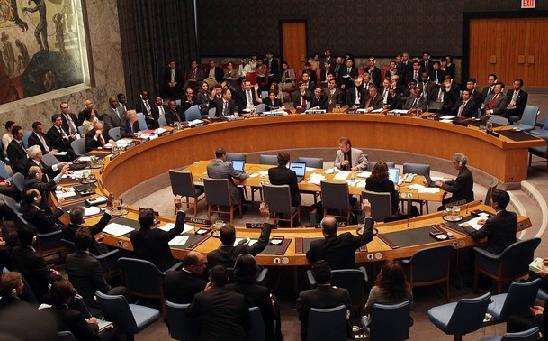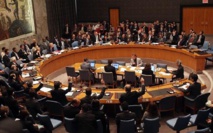Australia and the United States voted against, and five other countries abstained, including Britain.
The resolution drafted by the Palestinians and backed by Arab countries would have paved the way to a Palestinian state with East Jerusalem as its capital.
It set a 12-month deadline for Israel to reach a final peace deal with the Palestinians and called for a full Israeli withdrawal from the Palestinian territories by the end of 2017.
Security Council member Jordan had requested the vote on the measure despite opposition from the United States, which argued that the resolution did not address Israel's security concerns.
"This resolution sets the stage for more division, not for compromise," said US Ambassador Samantha Power.
"This text addresses the concerns of just one side."
US Secretary of State John Kerry had lobbied in the days leading up to the vote, calling 13 foreign ministers to explain US opposition.
Washington was not, however, compelled to resort to its veto power to block the measure -- a move that could have undermined US standing in the Arab world.
A US veto risked angering key Arab allies, including partners in the US-led coalition carrying out air strikes against the Islamic State group in Syria and Iraq.
Argentina, Chad, Chile, Jordan, Luxembourg joined France, China and Russia in supporting the resolution.
Lithuania, Nigeria, South Korea, Rwanda abstained, along with Britain.
- France votes 'yes' -
France backed the resolution because of an "urgent need to act," Ambassador Francois Delattre told the council. He expressed disappointment that efforts to negotiate a text that could win consensus failed.
"Our efforts must not stop here. It is our responsibility to try again. Before it's too late."
International alarm is growing over the ongoing violence and the failure to restart negotiations that last broke down in April, when US Secretary of State John Kerry led a push for peace.
On Tuesday, a Palestinian teenager was seriously wounded by Israeli gunfire in the West Bank, according to family members. The army said he had thrown a suspected explosive device at troops.
The vote caps a three-month campaign by the Palestinians at the United Nations to win support for a resolution that sets a timeframe for ending the Israeli occupation.
The Palestinians presented changes to the text on Monday, toughening up language on East Jerusalem as the capital of a Palestinian state and demanding an end to Jewish settlement building.
Palestinian envoy Riyad Mansour earlier called on the Security Council to adopt the resolution to show that it was in sync with international momentum to recognize Palestine and advance peace in the Middle East.
Mansour took an indirect swipe at the United States, saying Arab and European governments had sought compromise to "open a door for peace at the Security Council," but that "one party did not want to go along with this global consensus."
Washington has in the past repeated vetoed UN resolutions seen as undermining its ally Israel.
The Palestinians have warned that if the resolution is rejected, they will join the International Criminal Court to launch legal action against Israel and push for greater recognition through the UN General Assembly.
--------------------------------------------------------------------------------------------------------
The resolution drafted by the Palestinians and backed by Arab countries would have paved the way to a Palestinian state with East Jerusalem as its capital.
It set a 12-month deadline for Israel to reach a final peace deal with the Palestinians and called for a full Israeli withdrawal from the Palestinian territories by the end of 2017.
Security Council member Jordan had requested the vote on the measure despite opposition from the United States, which argued that the resolution did not address Israel's security concerns.
"This resolution sets the stage for more division, not for compromise," said US Ambassador Samantha Power.
"This text addresses the concerns of just one side."
US Secretary of State John Kerry had lobbied in the days leading up to the vote, calling 13 foreign ministers to explain US opposition.
Washington was not, however, compelled to resort to its veto power to block the measure -- a move that could have undermined US standing in the Arab world.
A US veto risked angering key Arab allies, including partners in the US-led coalition carrying out air strikes against the Islamic State group in Syria and Iraq.
Argentina, Chad, Chile, Jordan, Luxembourg joined France, China and Russia in supporting the resolution.
Lithuania, Nigeria, South Korea, Rwanda abstained, along with Britain.
- France votes 'yes' -
France backed the resolution because of an "urgent need to act," Ambassador Francois Delattre told the council. He expressed disappointment that efforts to negotiate a text that could win consensus failed.
"Our efforts must not stop here. It is our responsibility to try again. Before it's too late."
International alarm is growing over the ongoing violence and the failure to restart negotiations that last broke down in April, when US Secretary of State John Kerry led a push for peace.
On Tuesday, a Palestinian teenager was seriously wounded by Israeli gunfire in the West Bank, according to family members. The army said he had thrown a suspected explosive device at troops.
The vote caps a three-month campaign by the Palestinians at the United Nations to win support for a resolution that sets a timeframe for ending the Israeli occupation.
The Palestinians presented changes to the text on Monday, toughening up language on East Jerusalem as the capital of a Palestinian state and demanding an end to Jewish settlement building.
Palestinian envoy Riyad Mansour earlier called on the Security Council to adopt the resolution to show that it was in sync with international momentum to recognize Palestine and advance peace in the Middle East.
Mansour took an indirect swipe at the United States, saying Arab and European governments had sought compromise to "open a door for peace at the Security Council," but that "one party did not want to go along with this global consensus."
Washington has in the past repeated vetoed UN resolutions seen as undermining its ally Israel.
The Palestinians have warned that if the resolution is rejected, they will join the International Criminal Court to launch legal action against Israel and push for greater recognition through the UN General Assembly.
--------------------------------------------------------------------------------------------------------









 Home
Home Politics
Politics











